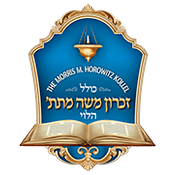Parshas Bereshsi 1


״ואְֵת שְׁניֵ בָניֶהָ אֲשֶׁר שֵׁם הָאֶחָד גּרְֵשׁםֹ כִּי אָמַר גּרֵ הָייִתִי בְּאֶרֶץ נכְָרִיָּה״ שמות יח;ג“
And her two sons, the name of the [first] one Gershom because he said “I was a stranger in a foreign land.” Shemos 18:3
The pasuk in our parsha mentions the name of the eldest son of Moshe Rabeinu; Gershom. Moshe gave his son this name as a remembrance of the time when Moshe Rabeinu was a stranger in the land of Mitzrayim. From the language of the pasuk it appears that Moshe Rabeinu was suffering personal pain as a result of being a stranger in the land of Midyan. This requires explanation, seeing as all of the Bnei Yisroel were suffering as strangers in the land of Egypt at that time. Why was the pain of Moshe Rabeinu considered personal?
We have to understand the difference between the pain of Moshe Rabeinu in Midyan and the pain of the Bnei Yisroel who were simultaneously suffering much the same pain as strangers in the land of Egypt.
R’ Meir Soloveitchik z”tzl explains that Hashem promised Yaakov Avinu that He would descend with him to Egypt, meaning that the Shechina (Divine Presence) would accompany the Bnei Yisroel throughout their galus (exile).
Hence we find that even though Bnei Yisroel were in galus and were strangers in the land of Egypt, the Shechina was amongst them, helping to soften the blow.
However, when Moshe Rabeinu ran away to Midyan, he did not receive the same promise from Hashem that the Shechina would accompany him. This is the reason why Moshe named his son Gershom, to remember his personal suffering whilst alone as a stranger in Midyan without the Shechina to console him.
On a personal level, we are all living in Galus today. We see that there is a way to alleviate some of our suffering by bringing the Shechina into our lives. If we walk in the ways of Hashem by learning His Torah and performing His mitzvos, the Shechina will come down to be with us in our current galus and support us until Mashiach comes, B’mheira B’yamainu.
Moshe Rothenberg / MMHK
